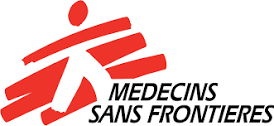Malnutrition in northern Nigeria
“I don’t know how to say it any more clearly. This is an emergency” Katrin Kisswani’s testimony on the malnutrition crisis in Kebbi, Nigeria
Across Northern Nigeria, a devastating nutrition crisis is unfolding. Katrin Kisswani, a nurse and President of MSF Belgium, has just returned from Kebbi, a state in the northwest of the country. Here, she shares what the team is witnessing on the ground—day after day.

“She was barely conscious when we arrived,” says Rukayya, cradling her little daughter in her lap. Hamida is nearly two, she tells me. When they arrived at Sir Yahaya Hospital in Kebbi a week ago, they were rushed straight into the emergency department. After a rapid assessment, Hamida was admitted to MSF’s inpatient therapeutic feeding centre. Her diagnosis was the same as every child admitted here: severe acute malnutrition.
Over the past twenty years, I’ve worked in MSF facilities around the world, but this is the first time I’ve seen an MSF project with such a massive number of malnourished patients. Our team in Kebbi runs two inpatient facilities and six outpatient clinics. Since June, more than 400 severely malnourished children have been hospitalised per week, while over 1,400 have received outpatient care weekly. The project uses 100,000 sachets of therapeutic food every week. Today, more than 9,000 children are enrolled in our outpatient nutrition programme. These numbers are staggering—and they’re still rising.

The causes of this crisis are complex. The economic situation in Kebbi is precarious, and food prices have skyrocketed. The security situation in several areas remains volatile, disrupting farming and limiting access to markets. Most people in Kebbi State don’t have access to clean water, and basic healthcare—including childhood vaccinations—is often unavailable or unaffordable. Sick children are far more vulnerable to malnutrition, and here they fall sick repeatedly with malaria, measles, diarrhoea, and tuberculosis—with little access to treatment.
This is not unique to Kebbi. The same situation is playing out across much of Northern Nigeria, in a crisis that has been building for years—and is now at an enormous scale.
In the emergency room and intensive care unit at the hospital, one thing struck me: the children were almost silent. Even during painful procedures like inserting an intravenous line—they didn’t have the energy to cry.

As I spoke with some of the mothers—through a translator—the same story kept coming up. Their child had fallen ill. They had tried to get care, but it was either unavailable or ineffective.
One woman told me her two-year-old son, Yakuba, had been sick with watery diarrhoea and fever. Desperate, and unable to get help locally, she travelled over 80 kilometers to reach the MSF facility. Another mother told me her one-year-old daughter, Kakamele, was born with a cleft lip and palate, making it difficult to eat. When she sought help at another hospital, she was told her daughter was too malnourished for surgery. By the time she reached our hospital, Kakamele was in such critical condition that she had to be admitted straight to the intensive care unit.
Typically, malnutrition cases are seasonal—the numbers fall after the harvest. But in Kebbi, that’s not happening. The numbers continue to rise, and the team is having to constantly adapt. Our colleagues have built an additional inpatient facility—but it’s already over capacity. They’ve even had to stop treating children with moderate acute malnutrition because so many others are in more critical condition.
When it was time for me to leave Kebbi, I felt mixed emotions. I was immensely proud of what we had achieved. MSF’s work in Kebbi is life-saving. But we cannot solve this crisis alone.
The nutrition crisis in Northern Nigeria is a public health emergency. Children are dying, the crisis is out of control, and the outlook is worsening given the cuts to international aid budgets.
Prevention must be prioritised by the Nigerian authorities and aid organisations, with funding made available for food or cash distributions, vaccination programmes, and community health centres. Supply chain issues for therapeutic food must also be urgently resolved—this treatment is essential for survival and must be available for every child who needs it.
MSF teams are working at their limits—often in areas where we are the only international humanitarian organisation present. With the current trend, the already insufficient support could collapse entirely, and we may soon be looking at an even more catastrophic situation for the children in Northern Nigeria.

Supporting these children is literally the difference between life and death. Hamida—the little girl who arrived barely conscious at the hospital—was nearly ready to go home when I met her. As I approached, a strange-looking visitor, she did what any well-nourished child might do: she took one look and screamed energetically. Her mother hugged me with joy.
But the painful truth is that not every child makes it home. In MSF’s hospital in Maiyama, I saw another patient—a three-year-old child, wrapped in a survival blanket, unconscious and struggling to breathe. The team was doing everything possible, but I was told the highest mortality rates occur within the first 48 hours of arrival. Some families simply don’t reach us in time.
This deadly cycle of hunger and disease is escalating across Northern Nigeria. Our teams are doing all they can—but we need others to act now. Every delay costs lives.
I don’t know how to say it any more clearly: this is an emergency.
---------
MSF manages 11 inpatient therapeutic feeding centres (ITFCs) and more than 30 outpatient therapeutic feeding centres (ATFCs) in seven states in northeast and northwest Nigeria: Borno, Bauchi, Kano, Kebbi, Zamfara, Sokoto and Katsina.
Hannah Hoexter
